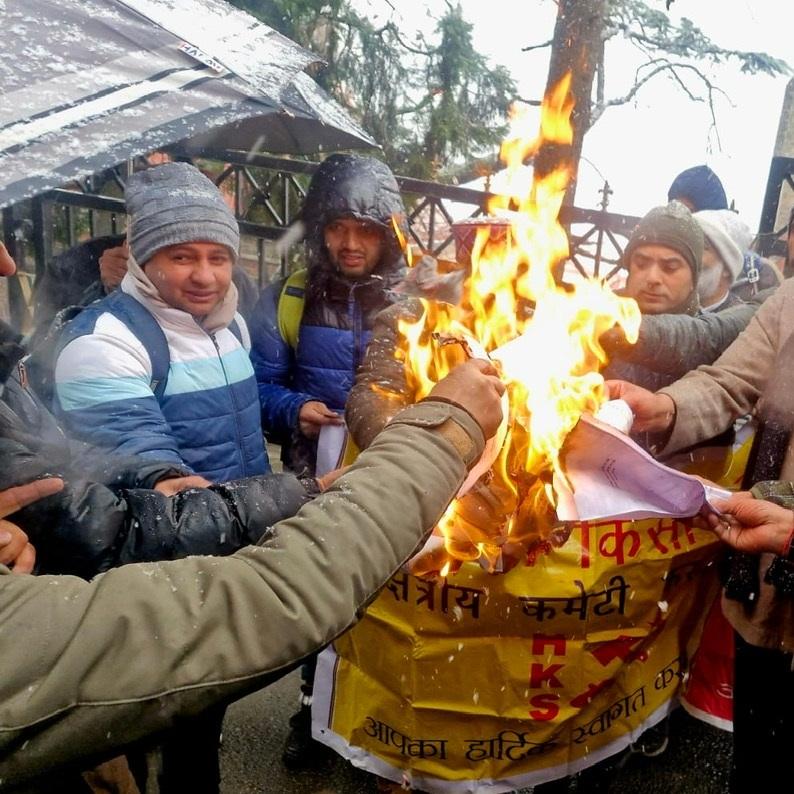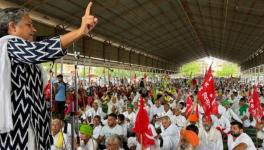Save Dallewal’s Life, Hold Discussion on MSP, Says SKM in Memo to President Murmu
At the call of SKM, farmer organisations held protests across the country on Monday, December 23, 2024, seeking legal guarantee for MSP and in solidarity with fasting leader Jagjit Singh Dallewal.
New Delhi: Thousands of farmers associated with the farmers’ collective Samyukta Kisan Morcha (SKM) poured into the streets on Monday to express their discontent over “continuous apathy” toward the fast unto death of farmer leader Jagjit Singh Dallewal and “consistent harassment” of farmers across the country.
Dallewal, president, of the Bharatiya Kisan Union (Sidhupur) has been observing fast unto death for 28 days to press the government to ensure minimum support price (MSP) as per the MS Swaminathan Commission recommendations and one-time debt relief from government banks and private moneylenders. There were reports of widespread protests on Monday in Andhra Pradesh, Odisha, Punjab, Haryana, Kerala, Tamil Nadu to Kashmir and Uttarakhand.
Farmers organisations are also enraged over arrests and registration of alleged fake FIRs in Greater Noida in Uttar Pradesh where they have been demanding development of 10% residential plots given in lieu of land procured for residential societies and industries. The protesting farmers also burnt a copy of the draft National Policy Framework on Agricultural Marketing which they alleged was “the return of the repealed farm laws through backdoor.”
Kuldeep Singh, who was part of the protesting farmers in Jogindernagar, Mandi, Himachal Pradesh, told NewsClick over the phone that they submitted a memorandum to President of India Droupadi Murmu through Block Development Officer, Mandi, and burnt the draft of the proposed agriculture marketing policy.
“We fought a year-long struggle at the borders of Delhi and it was the martyrdom of 750 farmers that pushed the Narendra Modi government to repeal the three black farm laws. Now, this policy seeks to transfer our produce to private traders without fair pricing. The policy document does not even mention the word MSP. Similarly, it has recommended contract farming.”

Protesting farmers burning copies of the draft National Policy Framework on Agricultural Marketing.
Farmers organisations are also furious over non-consultation in the framing of such a crucial policy that involves the livelihood of millions of farmers and their families.
The SKM said the protests were being held to remind the Centre of its promise to devise methods to ensure MSP in a legal framework. While some farmer organisations pressed for complete procurement of produce through state agencies, others wanted punitive charges for buying the produce below MSP.
The Centre, through its Secretary (Farmers Welfare) Sanjay Agarwal had assured the SKM leadership that it would form a committee, including representatives from the Centre and state governments, agricultural scientists and farmer leaders of different unions with the mandate to devise methods to implement MSP.
Agarwal’s letter dated December 9, 2021 also noted that the Union government in principle had agreed to withdraw criminal cases by its agencies for participation in the historic famers’ struggle and it would appeal to the state governments too to withdraw the cases. The Centre had also assured farmers that it would hold discussions on the provisions impacting farmers in the Electricity Amendment Act.
However, the government’s invitation to SKM to the committee on Zero Budget Farming was turned down by the Morcha leaders, who alleged that the committee had majority members who had backed the ‘black’ farm laws.
Why MSP is Crucial?
The farmers bodies have maintained that the Commission on Agriculture Costs and Prices (CACP), the Central body responsible for announcing MSP for procuring crops from farmers, had been employing a wrong methodology for calculating the input costs of seeds, fertiliser, herbicides, pesticides, diesel and harvesting. While CACP has used A2 + FL formula, the farmers have been demanding C2+ 50% for just returns on the produce. A2 covers major costs such as fertilisers, pesticides, herbicides and diesel among others and FL implies unpaid family labour. C2 refers to comprehensive costs that also cover rents and forgone interest on land apart from traditional costs.
On Dallewal’s fast and deteriorating health, SKM leaders said in case of any untoward development, the entire responsibility would fall on Prime Minister Narendra Modi, Home Minister Amit Shah, Punjab Chief Minister Bhagwant Mann and Haryana Chief Minister Nayab Singh Saini.
In a statement, SKM core team member Darshan Pal said, “Instead of discussing the acute distress faced by farmers and agricultural labourers, the NDA-3 government is further unleashing an onslaught on agriculture, industry and services through the New National Agriculture Market Policy and Digital Agriculture Mission, National Cooperation Policy, imposing four labour codes and One Nation One Election that erodes the federal rights of the State Governments to facilitate the corporate agenda of ‘one nation one market for corporate profiteering’.
Memorandum to President
The memorandum submitted to the President of India by SKM leaders read, “It is highly unfortunate that the Prime Minister, Shri. Narendra Modi is not ready to hold discussions with farmer organisations on struggles. Instead, consistent efforts are there to brutally suppress the struggles of farmers at Shambu and Khanuri borders of Punjab and Noida-Greater Noida in Uttar Pradesh by using tear gas shelling, rubber bullets, water cannons and putting hundreds of farmers in jail for holding peaceful demonstrations and Dharna.”
It further noted that In the Gautam Buddha Nagar, the FIR No.0538 dated December 4, 2024, revealed that the Police Commissionerate had implicated 112 farmers on false charges under Section 109 of the Bharatiya Nagarik Nyay Samhita for attempt to murder of a police sub-inspector…. “The farmers are in jail for the last 21 days,” it added.
The memorandum also held that the “new National Agriculture Market Policy is part of the strategy of the corporate agenda to permit backdoor resurrection of the three farm laws. The conscious efforts in the last two years to thwart procurement in APMC markets in Punjab and Haryana, dismantle FCI by promoting cash transfer on food subsidy, reduction of food subsidy by Rs. 60,470 Cr. and fertiliser subsidy by Rs. 62,445 Cr. in the last three consecutive years are corporate attacks on the existing system of limited MSP and Food security of the country.”
Get the latest reports & analysis with people's perspective on Protests, movements & deep analytical videos, discussions of the current affairs in your Telegram app. Subscribe to NewsClick's Telegram channel & get Real-Time updates on stories, as they get published on our website.
























